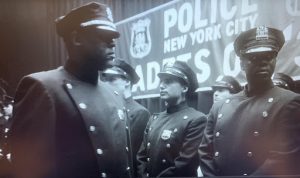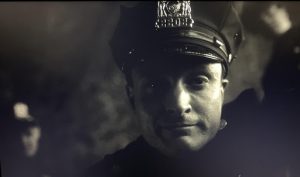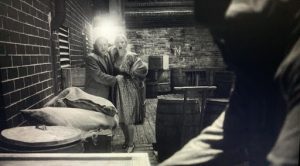100 Watchmen (2019-2020)
Watchmen (2019-2020): TV’s Masterpiece of Representing America’s Discrimination towards African-Americans
By Adison Emerick
HBO’s Watchmen series commentates throughout the show on this idea of generational trauma and specifically trauma created by racism. In Episode 6: “This Extraordinary Being,” we get a unique and possibly the most painful origin story we’ve seen in Television history. It transports us to a time in our history where racism was still prevalent and gives us a perspective we’ve never seen before. This episode does an excellent job of representing discrimination through the use of realism by having powerful acting through the use of the actors’ facial expressions. Along with realistic dialogue and using camera angles that put us in the position of the main character Will Reeves. These cinematic elements bring the world to life and the pain of discrimination to life. This episode is truly remarkable, and people need to see this episode so that they truly understand the power behind these cinematic techniques.
In this episode, we follow the origin story of Hooded Justice, a famous vigilante who was previously thought to be white. The main character, the man under the hood, is Will Reeves. He’s in his early thirties and at the start of the episode newly working as a police officer in the late 1930’s New York City, one of few African-American officers at the time. When he was a child, he survived the horrific 1921 Tulsa Massacre by his parents sacrificing their lives to save him. This was a real massacre where white mobs slaughtered black people, destroyed their homes and businesses. It’s considered today to be one of the single worst incidents of racial violence in American History. With such a traumatic past Will does his best to cope with it by forgetting his past and dismissing the horrific events. By doing this he can only hold in his anger for so long. The scenes that best display the impact of discrimination and how realism is used to display are as follows:
- The police inauguration where Will is getting his badge to officially be a police officer.
- The dinner date between Will and June as they discuss how angry Will is and his denial of his past. June is an African American reporter who is Will’s love interest.
- When Will is walking home from work and is followed by his fellow police officers who are white and is eventually beaten up then lynched.
- When Will is walking home from the lynching and hears screams for help he beats up the muggers trying to rob a couple in an alley.
- When Will makes it home and admits his anger and is forced to take matters into his own hands and become a vigilante.

Jovan Adepo’s job of acting as Will Reeves brings the seriousness, the realism, and the pain of racism to the screen through his use of facial expression. This phenomenal job gave us the viewer a glimpse into the life of the oppressed in a world full of discrimination. The intro is a good place to start, the police inauguration. We see Will Reeves waiting to get his badge from the police chief. Jovan is visibly happy. He has a smile and his eyes give off this joyous feeling, as Will is about to get his badge and finally become a police officer. The police chief who’s white is giving badges to the other newly inaugurated police officers who are also white, and he’s physically happy, smiling and wishing them good luck. When the police chief finally gets to Will, he gives him a straight face and walks past him. Jovan’s face is then visibly upset, you can see his smile fade, and the disappointment and sadness reach into his eyes. Then Lieutenant Battle whose black walks up to Will and gives him his badge. Jovan is then again visibly happy grinning. This physical communication between the police chief and Will gives us our first look at discrimination in this episode. By having the police chief give badges to all the other new police officers who are all white and having him look at Will and walk past him tells us that the police chief intentionally missed Will so we can assume he’s a racist. Most importantly though it shows that discrimination is not always verbal. The police chief didn’t say anything to express this, but his actions spoke loudly. Then with Jovan’s facial expressions you see the sadness it brings to Will you see how non-verbal racism can be just as harmful as verbal. The realism of this situation makes your heart sink because it opens your eyes to the small things that are done to minorities to perpetuate this idea of less than white. This realism is something Adepo was striving to project to the screen. In an interview with Thrillist, Adepo explained. “It was our responsibility to tell this moment in history with sincerity, and to not be afraid of the uncomfortable, because telling it in all of this ugliness and all of this truth is the only way to really do it.” That’s exactly what this episode did, in the realism of the ugliness of racism and discrimination you felt the pain and emotion from Jovan’s facial expressions. The police chief isn’t giving Will the satisfaction of being equal to him as he is to the other white officers. Not giving Will his badge and staring right at Will in his eyes is saying you’re less than me, you don’t deserve the honor of having me give you a badge, and wish you luck. This subtleness of racism later disappears as we see how the cinematography puts it front and center for us the viewer.

The cinematography in this episode brought not only the late 1930’s to life but put us the viewer in the position of the main character Will Reeves. By having the camera in the position of Will we saw the world through his eyes and through his eyes we experienced these difficult situations. Doing this allowed us the viewer to sympathize with Will on a deeper level because in a way the discriminatory acts appeared to be happening to us. Then also we have a glimpse into the anger he feels from these discriminatory acts. From 19:08 to 20:36 the camera is in the position of Will so the characters are talking to the camera and we’re seeing the world through his eyes. During this sequence, Will is beaten up and then hung from a tree. Having the camera be in the position of Will during this horrific act continues the use of realism in the episode. As the viewer, we can’t escape the lynching by looking somewhere else and it makes us experience this racism as if it’s happening to us. This it finishes off with the police officer telling Will to keep his nose out of white folks’ business and again the character is talking to the camera. It immerses us in Will’s world, a world of fiction in the show but real in our world and our history. You’ve possibly seen a documentary in which lynches happened, but I’ve never seen one where the viewer is in the position of the person being lynched. By doing this it makes us sympathize with Will but also in a fraction of a way feel his anger and deep remorse for those who were lynched. While this show is fiction, these horrific acts were real, and it forces us to examine our own history with racism and the byproduct of lynching its legacy of trauma.

It then makes sense why the proceeding scene will happen. Will walks down an alley and hears a woman scream for help, a classic superhero trope. He’s consumed with anger for what’s all happened to him and he makes eye holes in the hood and puts it over his face so that he can finally be free to let out his anger. As the camera follows Will fighting the muggers, he moves left and right and the camera dollies left and right. Refusing to allow the viewer look elsewhere so that they’re as consumed with this fight as Will is. Then as the fight finishes and you get the shot of Will in the foreground with his eyes all wide and deep with anger and you see the couple in the background. You begin to understand that by having the camera on Will and not the couple throughout the shot the fight is for him, not the couple. It’s for him to finally let out his anger for the terrible, sickening things that have happened to him because of how he was treated based off the color of his skin: his parents murdered by KKK members in the Tulsa massacre, not getting his badge presented by the police chief, catching a criminal and being lynched for it. All these terrible things building up in him and he explodes as any normal person would.
Trying to properly tell a story about our racist history and connect it to a superhero plot is incredibly challenging. Not only because of trying to get the proper slang of the time but because you’re dealing with such a sensitive issue of racism in America. In order to properly deal with these issues, head writer for Watchmen Damon Lindelof created a diverse team of writers, “The room was half black and half women” (Vulture). By having such a huge portion of the writing staff being black it helped the overall team create dialogue that was true to the story and the experiences. The heaviest and most impactful use of dialogue was the scene right after Will beat up the muggers where Will makes his way to June’s apartment and admits his anger and is putting on white makeup to become Hooded Justice. At 26:20 June asks Will “What color were those townsfolk?“ Will replies “White” and June says “You ain’t get justice with a badge Will Reeves, you gone get it with that hood, and if you want to stay a hero, townsfolk gonna need to think one of their owns’ under it.” This scene shows something that I don’t believe has ever been explored in TV or Movies. The concept that even the vigilante has to put on makeup to hide their identity even more. And it’s not because they want to fool everyone it’s because they HAVE to. If there’s a black vigilante, then he’s considered a criminal and will most likely be murdered but if there’s a white vigilante then he’s a hero. It’s something you’d never think about but because this episode is true to the time and so true to real life, they explore it. It’s the dialogue that sticks with you long after the episode because it’s an incredibly depressing truth. Black people for a large portion of America’s history have been treated less than human, from beatings, verbal assaults, lack of opportunities, and sadly so much more. The dialogue in this episode makes you feel uncomfortable, it makes you feel sad, it’ll even make you angry because it’s realistic. It makes us confront our past so that we keep it our past.
What’s extraordinary about this episode is that it’s given an origin story that popular culture has rarely seen. Not only is the main character black but it goes straight into America’s history with racism and tells a realistic story from what I can tell. Being white I in no way shape or form relate on a personal or even imagine the things these characters have gone through. With the show being so realistic it’s given a voice to the voiceless and has shared a story that I’m sure can relate to many African American people and that’s amazing. As I discussed earlier Will has to put white makeup on his face because if there’s a black vigilante in 1930’s America he’s perceived as a criminal and will probably be murdered. But if there’s a white vigilante then he’s a hero. This commentates on our popular culture today and the whiteness of our superheroes. This idea was boughten up by Mazin, the host of The Official Watchmen Podcast, at 36:20 when Mazin said “In popular culture, our superheroes are white white white.” It’s incredibly true only till recently with Black Panther that we got a big production movie for a black superhero.
The world around the characters is much so connected to the plot and characters. Will Reeves is a black police officer in the late 1930’s and so the racial prejudice towards black people at the time makes the world a scarier and angrier place. The whole situation of Will having to deal with racism directly relates to my thesis. The realism of the world and the situations Will gets in are real and they destroy any sense of suspension of disbelief. The issues of racism are real and prevalent at that time so this episode expresses that by putting us in the perspective of the oppressed, Will.
This episode from the Watchmen TV series shies away from nothing and gives us the viewer a unique origin story that tells not only a story about the character but our history of discrimination. Through the uses of excellent acting and facial expressions, realistic dialogue, and camera anglers that put us in the shoes of Will. It transports us to a time and culture once fantasized for the classical music and old-timey clothes are quickly overshadowed by the horrific and commonality of discrimination towards black people.
References
Bastien, Angelica. “Who is Hooded Justice? Watchmen Has a Stunning Answer.” Vulture, 24 Nov 2019. Accessed 26 Feb. 2020.https://www.vulture.com/2019/11/hooded-justice-watchmen-hbo.html
Manzin, Craig, host. “Nostalgia (Episodes 4-6).”THE OFFICIAL WATCHMEN PODCAST, season 1, episode 2, HBO, 2019, https://www.hbo.com/watchmen/watchmen-listen-to-official-podcast
Stefansky, Emma. “Jovan Adepo on That Big ‘Watchmen’ Scene: ‘You’re Supposed to Feel Uncomfortable’”. Thrillist, 24 Nov 2019. Accessed 26 Feb. 2020. https://www.thrillist.com/entertainment/nation/watchmen-episode-6-hooded-justice-actor-jovan-adepo-interview
“This Extraordinary Being.” Watchmen, Season 1, Episode 6,” written by Damon Lindelof, HBO, 2019.

